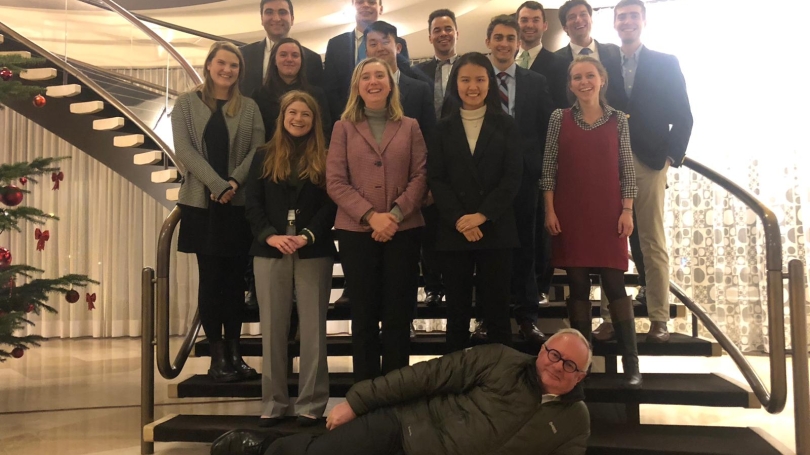
- Public Policy
- Leadership
- Funding
- News & Events
- About the Center
Back to Top Nav
Back to Top Nav
Back to Top Nav
Back to Top Nav
Our one full day in Basel was set to be spent at the Bank for International Settlements. The BIS is in many ways a central bank for central banks and is owned by 60 central banks from countries representing 95% of global GDP. The BIS aids central banks' pursuit of monetary and fiscal stability and facilitates international cooperation among central banks on these issues. Given the BIS's central role in addressing many of the issues we've been examining, and that the Bank was generously welcoming us for six hour-long meetings with officials representing different parts of the institution, we had very high hopes for an insightful and exciting day.
But even our high hopes and the fantastic schedule organized by Marie-Christine Drexler did not prepare us for the generosity, candor, insight, and kindness shared by everyone with met at the BIS -- first and foremost our guide, Paul Moser-Boehm, Senior Economist in Central Banking Studies.
Our visit began with a trip to the tranquil 18th floor of the BIS Tower, from which we had clear views of Switzerland, Germany, and France. From there we headed to our first two meetings of the day, first with the Committee on Payments and Market Infrastructure's Henry Holden, and next with Moser-Boehm. In each case, the specific substantive insights shared were matched with both broader institutional analysis and also career and life advice, all of which we found quite helpful. Among many examples, particularly revealing was Holden's description of moving up levels of analysis in his work until he could see and understand entire systems and the value he took from such a systemic vantage point.
Following an enjoyable lunch conversation -- and the second of many rounds of excellent coffee -- we resumed meetings with Ben Cohen and Patrick McGuire of the Monetary and Economic Department and Patrizia Baudino and Rodrigo Coelho of the Financial Stability Institute. We explored a range of comparative institutional analyses of post-crisis reform efforts, all of which helped contextualize the cases with which we were most familiar within the broader set of related global policy reforms from the last decade. We were treated to a wide range of insights about financial and economic data -- its collection, analysis, limitations, and how to think sensibly and humbly in a so-called era of big data whose unique benefits have perhaps been rather overstated. Beyond these insights, we also got more very helpful career and life advice, particularly for the many of us interested in graduate training in the social sciences.
Our final two meetings were with affiliated rule-making and standard-setting bodies, the Financial Stability Board and the Basel Committee on Banking Supervision. Revived by round three (or was it four?) of coffee, we engaged in a set of wide-ranging conversations, first with Costas Stephanou and his very generous Canadian colleague and then with Neil Esho, Joy Wann, and Marc Farag. These conversations enabled us to build on many of the specifics about which we had spoken throughout the day with BIS experts, as well as address the specific missions of the FSB and BCBS alongside larger empirical and normative questions about central bank governance, international negotiation and regulation, and global political economy and financial stability. These broader questions yielded fascinating dialogues and insights about political and economic power, democracy, global governance, and even graduate school battles between competing models of individual preferences and collective institutional outputs, the results of which appeared to be consistent with Professor Nachlis's views, which seemed to make him almost oddly happy.
Our time at the Bank concluded with an all-smiles photograph exhibiting Moser-Boehm's impressive dexterity, after which we departed the BIS, buffeted by a brilliant day of conversations and some umbrellas, for a nearby cocktail bar. The delights continued, as the bar was located in a building adorned with one of the world's largest concrete roofs and a multi-level looping slide. After some more wide-ranging conversation, drinks, and trips down the slide, Moser-Boehm bid us farewell, capping off a day at the BIS that will live long and fondly in our collective memories.
But the day was not yet complete. We headed to Papa Joe's, which is surely Basel's finest American/Tex-Mex/Caribbean restaurant that also has a 65 CHF hamburger on the menu, to meet with Will Wentworth T'13. Over the course of our meal, Wentworth shared a range of insights about European politics and policy, Dartmouth life, post-Dartmouth life, and navigating international careers. Over the course of our meal two group members also had an intense and fascinating multi-hour debate about the nature of political morality. And at the conclusion of our meal, a massive hole was blown in the Professor's planned food budget -- but it was of course all well worth it.
After thanking Will, departing the restaurant, and a glorious day filled with a remarkable degree of generosity and insight, we returned to our hotel to get a bit of sleep -- all before the next morning's 8-hour train ride that would take us from Basel to Berlin.